Barbara Rainey's Blog, page 3
November 26, 2024
When Family Expectations Collide: A Story About Grace & Truth


In the first year of our marriage, Dennis and I made an unintentional and yet very serious mistake, one that inflicted profound disappointment on two very important people. The rolling, repeating waves resulting from our mistake washed over onto us, too, and the drying out took longer than we ever imagined.
Like most newlyweds Dennis and I enjoyed spending all our time together. True to our season of life, we were mostly oblivious to other people outside our little bubble of two. Eleven months into our marriage our best friends from college called, inviting us to visit them in Oregon. From our new home in Colorado, driving to see the beauty of the Northwest sounded like a grand adventure and an opportunity to celebrate our first anniversary in memorable style.
The problem was those days coincided with my parents 25th anniversary. In Dennis’s family the celebration of anniversaries came and went without a mention, so his vote was to skip going to Houston for that weekend. I had a twinge of doubt, but to my knowledge nothing big was planned, so without calling to check I naively agreed.
On the eve of our departure for Oregon one of my younger brothers mentioned the family was all going to dinner. It sounded casual. But we found out afterward that it was not.
My parents perceived our decision as a very significant rejection.
In spite of my repeated apologies and attempts to make amends, we felt we were sinking in an undertow. My parents did not have a biblical understanding of forgiveness or conflict resolution, so the stew of disappointment and loss cooked too long. Living far away geographically made it difficult to spend more time with them to replace the bad memory with new good ones.
This was the first of many significant disappointments my parents experienced with my brothers and me, and us with them, as we four siblings became adults and began to live our own lives. My parents learned, as Dennis and I have, that the addition of spouses with different values, opinions, and life experiences can sometimes amplify the normal losses and disappointments of children becoming adults.
Over many years of watching families around the world I’ve been comforted knowing none are perfect. Not one family, even one that appears perfect on Christmas cards or in church, is exempt from the sin and its fallout that plague the planet.
Many of the most significant disappointments we experience in life occur in our families.
Here are two of the lessons I’ve learned that have helped me navigate these waters of family disappointment:
The first lesson is to practice 1 Peter 4:8, which tells us to “Above all, keep loving one another earnestly, since love covers a multitude of sins.” My family of origin avoided conflict at all costs, but we did eventually practice a love and grace like that of which Peter speaks. We forgave or moved on. Dennis and I practiced forgiving without a reciprocal response as Paul admonishes, “Be kind to one another, tenderhearted, forgiving one another, as God in Christ forgave you” (Ephesians 4:32). Jesus our example loved and forgave over and over as His last minutes of life on earth profoundly illustrate.
Of the two guilty criminals hanging on crosses on either side of Jesus, only one recognized His innocence. Only one recognized He was more than a mere human. And only one asked the crucified God for help.
The sinful guilty thief did not pray the sinner’s prayer first, nor did he confess his sins one by one in prayer before the Savior of the world. Simply and shockingly to our constant searching for formulas and rules, Jesus demonstrated God’s grace when He spoke words never forgotten since: “Today you will be with me in paradise” (Luke 23:43).
Could it be that Peter the apostle was remembering this profound act of grace toward an undeserving sinful man when he wrote so much about love in his first letter? Peter had a memory bank filled with images of grace like this one. How can we be “holy as He is holy” if we don’t forgive and show grace like Jesus did?
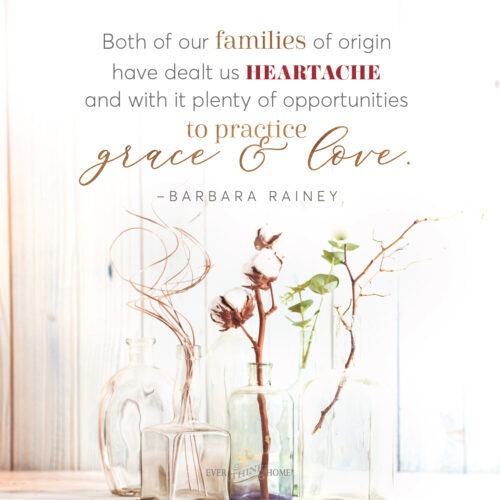
Both of our families of origin have dealt us heartache and with it plenty of opportunities to practice grace and love. Disappointment results because our love and grace and prayers have not resolved relational difficulties as we’d hoped. One reason is all relationships are two-way. Both sides must choose God’s way over self’s way. While we wait for God to work, we give thanks for the healthy relationships we experience with those who share our biblical worldview and values. We long for all, but we wait by faith.
The second lesson is to practice “benevolent detachment.” This is a concept John Eldridge writes about in his book, Take Back Your Life. It simply means caring for the many other people in your life and world but not becoming entrenched in what you can’t control or change.
With our adult children, for instance, we act in loving benevolent ways. We call and visit, send birthday gifts, attend as many important family events as possible, and we alternate holidays to get as much time with them as we can. We choose to listen to any woes they desire to share. We listen and empathize, but we also choose not to become emmeshed, worried, or afraid.
It’s much easier said than done, but we continually give our kids and their kids to God. He can work in ways we can’t. Doing this allows us to remain detached in a healthy way from their circumstances. And if they ask our advice we respond cautiously and conservatively.
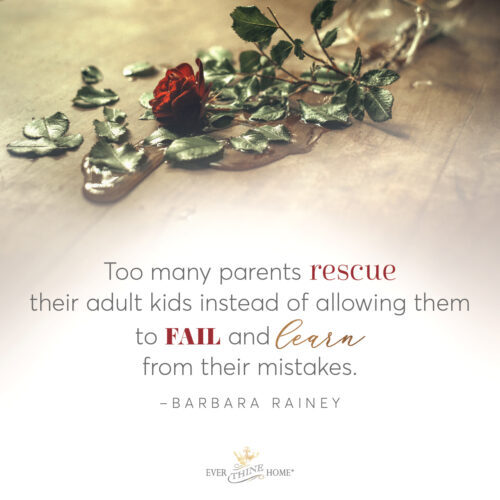
Too many parents rescue their adult kids instead of allowing them to fail and learn from their mistakes. (And too many parents raise their children without allowing consequences for their behavior, fearing they’ll damage their little hearts with discipline.) God is not afraid to let us crash and burn and learn. He can heal all wounds. We are to imitate Him, not the world.
It sounds unloving and uncaring to “let go” of other people’s concerns. And I’m not saying you should practice indifference from the cares of your family. There will be times when it’s appropriate to offer help. But God didn’t make us to carry the cares of the world or even the cares of a small part of the world called family. We can’t save anyone nor are we supposed to. It’s God’s job to save and carry the world. Remember, “Cast all your anxiety on him because he cares for you” (1 Peter 5:7, NIV) and “Come to me all who labor and are heavy laden, and I will give you rest” (Matthew 11:28).
The benefit of benevolent detachment is also two-way. Parents can love and care and be involved as requested and have time to enjoy the later years of their lives as God leads. Adult kids can learn from their mistakes and grow up into role models for their own children to imitate. Much of the reason for our many family disappointments is we expect what is not possible on earth—peace with all and no conflict with any. Though we love our grown children and always will, we are not responsible for them anymore.
Family disappointment will last until Jesus comes back. Until then our call is to practice John’s admonition, “Love covers a multitude of sins” and benevolent detachment which cares as it gives them all to God’s better care.
The post When Family Expectations Collide: A Story About Grace & Truth appeared first on Ever Thine Home.
November 25, 2024
The Surprising Truth About Gratitude (And Why It Heals Your Heart)
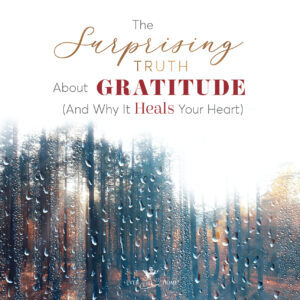
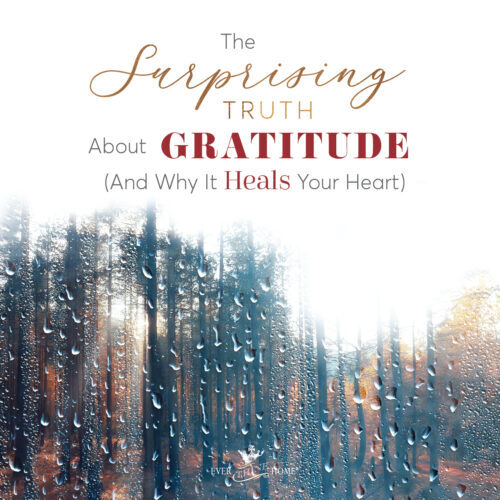
One spring, years ago now, Dennis and I watched other families experience all the celebratory festivities of a child’s senior year in high school: proms, award nights, graduation.
But our daughter, a senior that year, had decided she was done with school. At 18, she knew she was not legally bound to us anymore. Six weeks before graduation she dropped out and moved in with a friend who we barely knew.
I remember keenly the loneliness, isolation, and great sadness we felt as parents when all of our friends, many of whom we’d known since our kids were in grade school together, all gathered happily at awards night and then at graduation. But we were home, alone. Wondering where our daughter was. Wondering if she was safe. Fear was our companion.
I was not happy, nor was I thankful. This was not what I had prayed for. This was not good for our daughter or for us.
You may be facing difficult situations like this in your life. So how do you face the rapidly approaching holidays this year when your world has been turned upside down?
What do you do when you scroll through your social media feed and see stories and photos from others and their apparently perfect days, perfect families, and beautiful holiday preparations?
When photos pop up on your phone from years ago with memories of happier days, what do you do? The reminders are painful stabs of what could have been or should have been. And it hurts … deeply.
As you approach the Thanksgiving and Christmas holidays, how do you manage festive events and family gatherings when your world is filled with conflict and pain?
Heartache and change are normal. “Happily ever after” is not.
First, remember this truth: We aren’t in heaven yet. We still live on a broken planet, one that has always been infected with sin and death. God tells us we are “aliens and strangers” (1 Peter 2:11) on earth looking forward to a new heaven and earth where one day all will be well (see Hebrews 11 and Revelation 21:5). That reality helps right size any expectation of perfection or perpetual happiness here and now.
Second, avoid social media during this season. Don’t give opportunities to the enemy of your soul, the devil, to cause you to compare with others who appear to have what you don’t. Instead of scrolling through images, scroll through your Bible. Do a word search on gratitude or thanksgiving or heaven to remind yourself of what is lasting. Feed your soul with eternal truth. Don’t put the junk food of social media into your heart.

Third, give thanks. I can’t tell you how many times I didn’t feel like giving thanks, forgiving, or showing grace. But it is an imperative, a bedrock essential of belonging to our Father in heaven as His child. When I choose to give thanks for my circumstances by faith I am reminding myself of several things:
God is in control. My friend Nancy DeMoss Wolgemuth wrote in her book, Heaven Rules, “… He is sovereign over everything that touches us … He is ruler over every diagnosis and prognosis, over all incomes and outcomes, over the most daunting challenges as well as the most seemingly trivial details of our lives.” “God is in control” is not a trite statement. It is the truth.He has a plan and is working it. John Piper said at a conference I attended some years ago, “God is always doing 10,000 things in your life, and you may be aware of three of them.” We only see the current minutes and hours, while God sees every tomorrow and is always working good for those who love Him. And it’s good to remember His plan for you will never look like His plan for anyone else. Stop comparing!He can be trusted at all times. In spite of what we see and can’t see remember God sees all and is ahead of us in every circumstance. He is never surprised by those things which surprise us.In God’s realm, giving thanks isn’t optional. It’s not okay to forego gratitude. 1 Thessalonians 5:18 tells us, “give thanks in all circumstances; for this is the will of God in Christ Jesus for you.” In every situation and circumstance, good or bad, God commands us to give Him thanks.
Thanking Him is an acknowledgement of His authority. It also realigns our thinking and our faith with what is true. Romans 8:28 tells us, “And we know that for those who love God all things work together for good, for those who are called according to his purpose.”
It’s likely that the working of the good that God intends won’t be in our timing, meaning it won’t come nearly as fast as we’d like. The change we desire might not even happen at all.
But the outcome isn’t the point. It’s all about our hearts. Believing in Him by faith is what He desires. As 1 Samuel 16:7 says, “For the Lord sees not as man sees; man looks on the outward appearance, but the Lord looks on the heart.”
With Thanksgiving approaching, and especially if the holiday feels all wrong, may I encourage you to choose today to give thanks for what He has allowed in your world, especially those things that are hard and unpleasant?
Write a list of the ways He has blessed you even in dark times. It is good and biblical to share your hurt and pain and losses with God. He wants to hear you express it. He knows anyway. But it’s equally important that you thank Him for all of it; good and not so good.

God has a plan and will show you the way, but the first step to finding peace and rest in the turmoil of the now is to give thanks. Giving thanks clears the clutter in our hearts.
May you open the door to His presence by giving Him your thanksgiving.
May you experience the relief that giving thanks can bring.
May you know the peace of His presence with you in this season when it seems that everyone is happy but you.
May you trust God as never before.
The post The Surprising Truth About Gratitude (And Why It Heals Your Heart) appeared first on Ever Thine Home.
November 18, 2024
Finding God in Your Stress: How to Experience Peace When You’re Overwhelmed


A lesson I’m still learning, but understand more clearly with each decade of life, is that fixing my circumstances is rarely the answer to reducing stress.
The “whens” were a repeated refrain for me for decades, beginning when our children were all little. Life will be so much easier when she sleeps through the night, or when the littlest one is out of diapers, or when he can tell me what he needs and wants, or when they are all in school, etc, etc.
It seemed so reasonable, so logical.
Then my goal line moved and with big kids I said to myself: When full time parenting is over … when all my kids are grown and on their own … then I’ll be so much more relaxed, have more time to myself, and feel a lot less stress.
There was always this horizon just ahead which I assumed would mean smooth sailing. It took me a long time to understand it’s not just circumstances that bring stress. The bigger problem was my heart wants heaven on earth.
Somehow for most of my life I didn’t see the very clear declaration Jesus made in John 16:33: “In this world you will have tribulation” (other translations substitute trouble). And Job 5:7 tells us, “man is born to trouble.” These verses are not my favorites, but they are true and they aren’t the only ones reminding us this world is not an easy place in which to live!

I’ve always wanted “Happily ever after.” Haven’t you? I even tried to achieve that in our little family in our little corner of the world. But even our best efforts resulted in more pain and difficulty than I ever imagined.
Why? Because our world is infected by sin. Trouble and stress are just two symptoms of the disease which plagues our planet.
God also knew that the bubble of peace and paradise I longed to create, if I had succeeded, would have left me without a felt need for a Savior and therefore with no hope for heaven.
Today I know more of God’s truth and His ways, and I am also more patient with His work than I was 20 years ago. In this empty-nest season, the state of my soul can still know stress. I naively thought the empty nest would mean more time for me and more time for my relationship with Dennis. And though that’s been true in some ways, it’s also been much harder and more difficult than either of us expected, especially since “retirement” from a lifetime of leading FamilyLife.
In mid-October this year, I found myself dreading the coming weeks. I, who have loved holidays my whole life, am now in the place of wishing life would slow down because I’m not ready for the stress that comes with preparing for these big annual events, even though they are always worth it. There are solutions, like cutting back on decorating or baking, which we don’t need anyway. But that too requires evaluating and decision-making which takes energy and can create stress.
In the midst of this wishing time would slow, I remembered I was not taking everything, and I mean every single little thing, to God. I realized I was trying to figure out solutions on my own or strategizing how to solve this dilemma when I need to pray first about EVERYTHING.
The verse that literally was the word from God to my heart (and led me to surrender to Jesus as my Savior as a college student) was Philippians 4:6-7, “Be anxious [stressed] for nothing, but in everything by prayer and supplication with thanksgiving let your requests be made known to God. And the peace of God, which surpasses all comprehension, shall guard your hearts and minds in Christ Jesus” (NASB).
The best way to manage stress is to practice this verse … EVERY. SINGLE. DAY. Thanksgiving is coming, so start practicing this verse as a way to be thankful and to see God work in your heart.
The bottom line is there is no escaping stress regardless of your season in life. The good, even best thing about stress is that God wants to use it to help us experience more of Himself. He wants me and you to have a personal encounter with Him more today more than we did yesterday.

A little poem I found by Annie Johnson Flint summarizes well the feelings of our common stress.
Pressed out of measure and pressed to all length;
Pressed so intently it seems beyond strength.
Pressed in body and pressed in soul;
Pressed in the mind till the dark surges roll;
Pressure by foes, pressure by friends;
Pressure on pressure, till life nearly ends.
Pressed into loving the staff and the rod;
Pressed into knowing no helper but God.
God wants the normal and supernatural stresses of life to press me into Jesus. Therefore pressure, trouble, difficulty, and every other synonym for this commonality of life can be good. Even very good. Trusting God by practicing Philippians 4:6-7 doesn’t change my circumstances. It changes me. And that is what God desires most for me, that I become more and more like Jesus!
Happy Thanksgiving … and may you know more of Him every day this month and next!
The post Finding God in Your Stress: How to Experience Peace When You’re Overwhelmed appeared first on Ever Thine Home.
November 11, 2024
The Divine Pattern In Adoption, Part 2: What My Daughter Taught Me About God’s Love

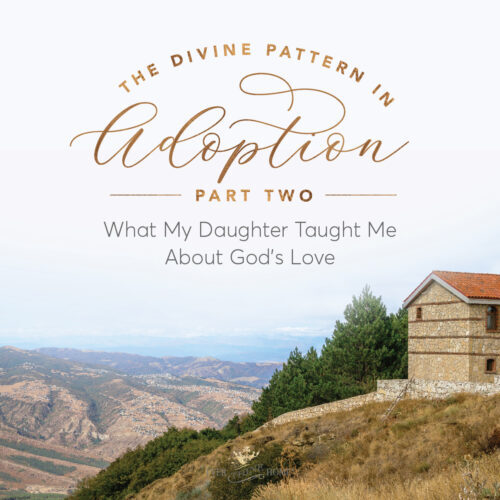
When our adopted daughter was in her late teens I was spent, not just by our journey with her but also from parenting all six of our children for so many years. In addition, my heart was wounded by the fallout and heartache, and my body was deeply fatigued from the burden of unrequited love.
In my own weariness I realized how much more God grieved over my own sin and refusal of His ways. His love is infinite, but so was Jesus’s suffering on the cross for His own who reject Him in a million ways daily. As a mom I gave my life for my children and most of the time delighted to do so. My sacrifices for our adopted one were significant.
To have our best efforts rejected, as all of our kids did at times, and to have my love be unwanted and unappreciated, was deeply hurtful. I felt like a failure as do many parents. I recognized and felt the heart of God in my own experience of great loss.

I saw and appreciated His deep unending love for me in ways I hadn’t before. I knew a little of how God felt. I was humbled that He loved me that much and would never stop. And I was profoundly grateful for the experiences I’d endured that allowed me to see Him so much more clearly.
Seeing God more clearly through the lens of loss and hardship has been worth every minute of suffering, both from the difficulties of parenting and from the troubles of life. I wouldn’t trade Him for anything.
As our daughter grew up we were very open with her about the adoption. We talked about it, read books about it, and when she was older gave her what little information we had. Hers was a closed adoption, by the birth family’s choice, but we always said that when she was old enough and ready we’d love to help her find her birth parents. I was eager to meet them too. I wanted to thank her birth mother for giving her life and giving her to us.
She didn’t begin a serious search until she left home. When she did begin looking she didn’t have much to go on so she was frustrated with the process and gave up. Then during her 30’s she decided to try again. Sadly, she met a couple of women online who pretended to be her birth mother and got her hopes up. When it became clear they were not her birth mom, their deceptions and manipulations left her deeply disappointed.
But the last of these experiences became an unexpected gift to us. This woman seemed to be the one. Many details seemed to line up initially and she was friendly and very eager to arrange an in-person meeting with our daughter. When she asked for our contact information, we gave permission for the woman to have one of our email addresses. Several weeks later she emailed a very short introductory email. We sent an equally short reply.
A few weeks later this woman sent a longer email asking for more information. We weren’t sure what to say and didn’t reply immediately. We were speaking at a conference and we didn’t have the time to give this our attention until we arrived back home.
The morning we left the conference Dennis received a third email that was filled with anger and accusations toward us. It ended with a favorite line of toxic people: “You are not much of a Christian if this is how you treat people.” However, she made the fateful mistake of copying our daughter on the email. When our daughter read it she was very angry.
The next morning came a phone call I’ll never forget. Our daughter called to tell us she’d ended the relationship, deleted all of the correspondence and blocked this woman from finding her again. She told us, “If that’s the way she’s going to treat you, then I want nothing to do with her even if she is my birth mother. You are my parents and she’s not.”
For the first time we heard our daughter say the words, “I choose you.” In that moment all the losses we’d endured were worth it.
I’d always sensed our daughter was not fully committed to our family. It was clear she was not sure she wanted to be ours. Yes, we chose her, but adopted kids have no voice in the decision. It’s made between adults.
The question always is will they accept that God placed them in this family? Will they trust Him? Will they trust their adoptive parents or fantasize about another family, another life they imagine must be better than the one they have? This too is common with many adopted children and I understand why.

Can you now imagine this is how God feels?
He has chosen us, me and you, before we were even born.
He sacrificed for me and for you more than we can know or appreciate.
Jesus died for me and you so He can have a personal relationship with us!
He wants to be our Father, to give us good gifts and all His love. Amazingly even in our rejection and rebellions against Him He still gives us good gifts, still tries to draw us to Himself.
To have an intimate personal relationship we must choose Him on our own.
Since time began God has been willing to wait for us. In a similar yet vastly inferior way we were willing to wait as long as it took to be chosen and loved in return by our daughter. God’s promise to us is, “Then you will call upon me and come and pray to me, and I will hear you. You will seek me and find me, when you seek me with all your heart. I will be found by you, declares the Lord …” (Jeremiah 29:12-14)
Hearing our daughter say that she chose us took a long time, but the wait was worth it in the end. Even in the years since then she has had to make the same choice, just as we need to consciously and continuously choose to trust God.
God’s patience is perfect, as are all His attributes. God waits for us, even when we wander back and forth for years, to Him and away from Him, over and over.
He always waits.
The post The Divine Pattern In Adoption, Part 2: What My Daughter Taught Me About God’s Love appeared first on Ever Thine Home.
November 4, 2024
Lessons from Adoption, Part 1: God Chose Us
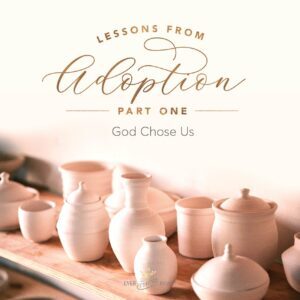
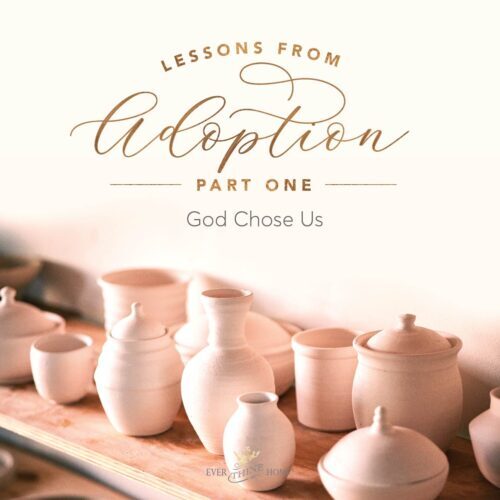
When our six children entered middle school and the teen years my prayers for them increased in focus and intensity. In fact, I started two prayer groups of moms which met weekly during the school years on Monday mornings. In the first group we prayed for teachers, tests, and friendships. We prayed that our kids would be protected from harmful influences that surrounded our budding young adults.
The second prayer group was with mothers of adopted children. Dennis and I had the great joy and privilege to adopt; the events that God orchestrated for this unborn baby to become ours were clearly divine and a wonder to behold. I’ve never forgotten any of them.
There were several families in our church in those years who also adopted. As these children reached middle school and early high school we began noticing traits and tendencies that were different than our biological kids. Adopted children deal with a wide range of challenges that result from the trauma of being removed from their birth moms or from the birth mom’s poor choices like using drugs or alcohol during the pregnancy. Reactive attachment disorder, ADD, and compulsive behaviors are just a few. When they reach adolescence there is the added challenge of identity. They ask questions like, “Who am I in this family that isn’t really mine? Why wasn’t I wanted?”
All teens experience the crisis of “Who am I?” but for adopted teens it is doubly difficult.
By the time these adopted children of ours reached 18 we moms were exhausted. We’d watched them collectively experiment with entry-level drugs, alcohol, and sex. They had chosen friends we feared were bad influences. Two or three of the kids dropped out of high school before graduation. Two were pregnant before twenty. And all of them dealt with depression or anger issues.
We moms prayed and prayed against all these harmful choices. For a year I fasted once a week for our daughter. We parents tried various solutions for our children we loved so much—medications, counseling and different theories and ideas we’d read in books. I still have an entire shelf in my study filled with books I read and underlined in my attempt to understand and to give her what we could.

In the end these adopted children had to find their own way, as do all of us, for we all host the desires of self in our hearts. Their decisions were their own, and the consequences were as well. In the end, from our limited human perspective the prayers and fasting we offered to God for our kids seemed to do little to impact the trajectory of their lives.
The hardest part for me was the disappointment with and confusion about God and His ways. Why had He not prevented this as I had prayed? My desire was only for my child’s good. Jean Fleming wrote, “A child is a piece of a mother’s heart walking around outside her body.” I’ve never forgotten those words as I suffered repeated grief over all my beloved children. None of my six is perfect. None of my six avoided hardship. I felt it all. Deeply.
And yet … just imagine how our Perfect Father feels over His billions of God-resistant lost children! The wonder is He knew we’d all go our own way and He still chose us as His own. Adoption is God’s idea!

In the early lines of Ephesians we find the word adoption: “he predestined us for adoption to himself as sons through Jesus Christ” (Ephesians 1:5). The concept is also repeated in five other verses in the New Testament. God saw the plight of his lost children and responded with the concept of adoption, which means being chosen by Him and grafted into His family. Adoption has been practiced by Christians since the first century when the infant church began adopting children thrown away in Rome.
The whole story of the Bible is one of God pursuing humanity to rescue us from the destructive behaviors and addictions we run to for comfort instead of running to Him. God is always working to bring us back Home.
· God woos and we reject.
· God delivers and we aren’t grateful.
· God provides blessings and we abuse them.
· God seeks us and we resist.
· He offers forgiveness and grace and we refuse to offer the same to others.
· God tells us we are trusting ourselves or other things but we don’t believe Him.
· God shows us we are building our own belief system, not His, by letting us get lost.
Early in our daughter’s teen journey we had a memorable encounter in our kitchen. She had come downstairs because she had to. Her preference would have been to stay in her room and not join the family for dinner or do her part to set the table. A very typical teenage position. (Her siblings often had the same attitude.)
On this evening Dennis looked her in the eye and said, “There are two ways we can go through this season of your teen years. One is together with your mom and me helping and encouraging you. The other is for you to go through it alone, refusing our presence. But regardless of what you choose, we want you to know …” and at this moment he paused for emphasis and made sure she was paying attention. “We want you to hear this clearly … no matter what you choose your mom and I love you and we would choose you again a thousand times out of a thousand …” another pause … “A thousand times out of a thousand. Did you hear that?”
As I listened intently to this conversation I realized this is how God feels about me. He has chosen me. He wants me to choose Him back.
There was a little twinkle in her eye and a sweet little smile. She heard and she knew we loved her and always would. In the decade that followed that little exchange we repeated “1000 out of 1000” to her dozens and dozens of times. It’s still true today.
God chooses you!
The post Lessons from Adoption, Part 1: God Chose Us appeared first on Ever Thine Home.
October 28, 2024
The Phantom Mom

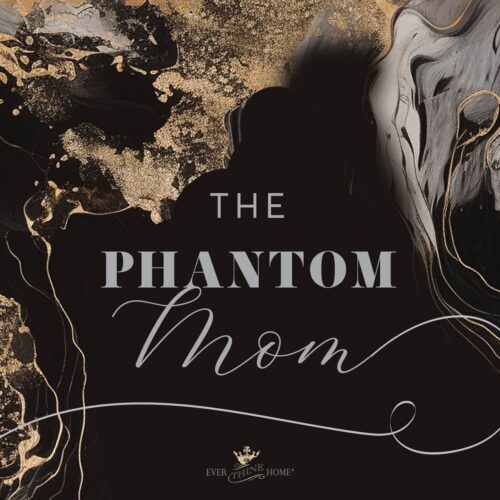
We women know well that comparison is a constant nemesis. But did you know that our daily measuring of ourselves has created a collage of ideals, an image of perfection, a phantom “me” within that can haunt us?
One day I pulled a cute shirt out of the corner of our closet where my spring/summer things are stashed, tried it on, and sadly found it was too tight. Ugh.
“This should still fit,” I thought as I took it off. “Shoulds” have plagued me for decades.
I should be able to handle this challenge at work, I should be able to come up with a solution for my kids’ constant bickering, I should be able to control my anger and my other emotions. And most important I should pray more often, and should want to read my Bible more. Mark my forehead with a giant scarlet letter F. Thousands of times I’ve scolded myself as a wife, a mother, a Christian because I failed to live up to this phantom image of what a godly Christian wife and mother should be like.
Does this sound at all familiar to you?
Years ago I made a list of the perfect Christian wife and mother. It helped me recognize the phantom expectations of myself that enslaved me and made me feel like a failure:
· She is always loving, patient, and understanding.
· She is well-organized, maintaining a perfect balance between discipline and flexibility.
· Her house is neat and well-decorated. She is never embarrassed if friends drop by unexpectedly.
· Her children obey her every command.
· She never gets angry with her children, even if they forget to do their chores.
· She is energetic and never gets tired, even after getting up five times during the night to care for her children … with a smile on her face.
· She manages her workload with her home tasks well and is always in the school pickup line at 3 p.m. waiting on her well-dressed, happy children.
· She reaches out to her neighbors and takes meals to the sick and needy.
· She looks fresh and attractive at all times.
· Her hair does what she wants it to do.
· Her fingernails are never broken but filed smoothly and painted with polish.
· She plans healthy, balanced meals for her family. She would never dream of feeding her family prepared foods like canned ravioli, frozen pizza, or hot dogs.
· She doesn’t get sick, lonely, or discouraged.
· She is always ready for and even initiates sex with her husband.
· She prays without ceasing. She chooses to be grateful for difficulties like a husband who is late for dinner or the neighbor’s dog chewing up her son’s new tennis shoes.
With a phantom like that, it’s no wonder so many of us women feel like failures as wives and mothers. Even though we know we can never live up to this perfect image, we still tear ourselves down when we fail to be perfect as we imagine it to be.
We believe deep down that we can become more perfect in our own power. This is a self-view inherited from our ancestors, Adam and Eve.
What impossible standards would be on your own list? What is your internal voice speaking to you about what you should or should not do? Make your own list because seeing those thoughts and shoulds in black and white will make it easier to recognize them when they whisper “failure” to you.
Also ask yourself these questions:
· When you compare your body to another woman, what do you expect from yourself?
· Have you ever compared your marriage to someone else’s? Write what you are expecting from your husband and yourself.
· What pressures do you feel with your child or children? Is it outside activities like sports or music lessons or grades? Identify what shoulds whisper negative words to you.
· In this digital world, parents must make hard decisions about screen time and smartphones and internet access. What pressures do you feel here?
· If your kids are grown, have you compared their achievements and “success” to others of their age?
Phantoms are crushing. My repeated failures to live up to my phantom expectations of myself left me exhausted, without confidence, defeated.

Here’s the good/bad news. Recognizing the impossibility of reaching any of your standards is the bad news; it’s hard to accept being limited and incapable. We resist giving up all our shoulds. Though I desire to be competent and strong and capable, seeing my inability is very good news for it forces me to recognize the truth of Jesus’s words, “apart from me you can do nothing” (John 15:5).
Jesus Himself, God incarnate, depended completely on His Father. He said, “I can do nothing on my own” (John 5:30). He chose to be dependent. I must also choose to be dependent. And knowing that truth about myself, as hard as it was to learn, has set me free to be who He made me to be and to experience His ability in my lack.
Begin to kill your phantom by thanking God that you will never measure up on your own and it is good because it can send you to Jesus.
Thank Him that He is able.
The post The Phantom Mom appeared first on Ever Thine Home.
October 21, 2024
My Favorite Prayer

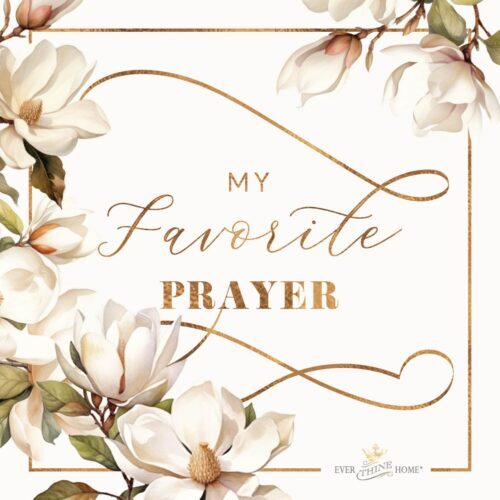
Do you ever feel like I do … weary, broken, bewildered?
Do you ever feel beat up by the world, by circumstances, by life in general?
Do you ever feel like your brain is clogged, in a fog, unable to form words, at a loss for what to pray to God? No words make sense?
I do.
Often when these questions describe my life, a day or a season of days, the words of the old hymn, “Guide Me, O Thou Great Jehovah” come back to me and each time express perfectly what I can’t say with words of my own.
“Guide me.” I so often don’t know what choice to make of the seemingly dozens of things I could do with my few minutes of time. Or the decision we need to make is about as clear as mud; not enough facts, not enough money, not enough time to see the way ahead clearly. I need guidance.
“O Thou great Jehovah.” When I say “Jehovah” I picture the God of the Pentateuch who led the children of Israel through the desert. They had no idea where this promised land was. They had no maps, no GPS. But Jehovah God, the One who named Himself Provider, Healer, Shepherd, Banner, Peace, Presence and our Righteousness, promised to get them there. I need this same Jehovah to guide me.

“Pilgrim through this weary land.” When I’m feeling lost, bewildered or confused, I am reminded that this earth is not my home. I am a pilgrim or, as Hebrews 11:13 says, a stranger and exile on earth. The land itself and all it contains is weary as creation waits eagerly and groans longing for its freedom from bondage to corruption (Romans 8:19-23). Always when I pray this prayer I too am weary, a directionless wanderer, and eager to be released from the constraints of this broken world. I am a pilgrim.
“I am weak.” My senses are not what they will be one day. I strain to hear God’s voice, His whisper, to see His clear path before me. I am weak.
“But Thou art mighty.” Remembering the limitless mighty power of my God lifts my eyes, my heart to believe I will be led in the right way. He knows I am weak, and He loves me anyway and will guide me! He is mighty!

“Hold me in Thy powerful hand.” What a comfort it is to be reminded that He holds me in His hand. And not just any hand, but a powerful one that will not let me go. Jesus told us, “no one shall snatch them out of My hand … and no one is able to snatch them out of my Father’s hand. I and the Father are one” (John 10:28-30). He is powerful!
“Bread of Heaven.” From the first pages of the Bible, through the captivity in Egypt and the journey through the desert, to the words of Jesus, God has made it clear He is the source of our life and our sustenance. He gave His children manna and Jesus declared, “I am the bread of life” (John 6:35). In hard times or challenging days I’m more aware of my need for His provision and it is always a good reminder that He is my food. He is my Bread of Life!
“Feed me till I want no more.” This ending line of the hymn’s chorus declares my heart’s desire to be filled with all of Him. What I possess in wisdom, intelligence, talent, or strength is never enough. In fact it is nothing at all compared to His infinite everything! He will feed me and sustain me!
After singing “Guide Me, O Thou Great Jehovah” several times in my head (never out loud because I scare myself), I begin to relax and remember He can be trusted again today, in this new situation in which I feel at a loss. He is not surprised, not bewildered, not afraid, not confused, not overwhelmed.
Nothing about my life is impossible for Him.
Amen.
The post My Favorite Prayer appeared first on Ever Thine Home.
October 14, 2024
Small Stuff, Big Stuff, and the Power of Beautiful Belief in Marriage


In high school, I discovered watercolor painting. It was love at first practice. I eagerly invested time, lessons, and supplies to become like seasoned watercolorists whose extraordinary works of art I admired.
Though I was passionate about this medium, I soon discovered it wasn’t as easy as it looked. Too much or too little water create two different problems; too much paint makes the sparkle of the white paper disappear; and wet paint that bleeds into other still wet colors can create what artists call mud. Coaxing purity and luminosity from paint and paper took more practice than I ever dreamed.
I saw hints of another kind of purity and transparency when I began dating my husband. The invitation to an authentic relationship—to be known and loved, to create beauty on the clean white paper of marriage—was what I’d longed for all my life. I eagerly said, “I do.”
A few years ago my youngest daughter, Laura, said “I do” with similar excitement. Her gorgeous autumn wedding was preceded by a couple’s shower, generously planned by friends and family. Most married five years or less, the attending couples shared their newly acquired wisdom with Laura and Josh.
Collectively, their repeated advice was “Don’t sweat the small stuff.” Last to share were our son, Samuel, a marriage therapist, and Stephanie, his wife of 16 years. He and Stephanie locked eyes, knowing their words would flip the others’ wisdom upside down, and then in unison they advised, “DO sweat the small stuff!”
Who was right?
This morning I walked into our kitchen to find my early-rising husband cleaning the island, his favorite landing strip for backpack, file folders, keys, and mail as he flies into the house after his day at work. Never mind that his office is literally three steps inside the front door—the kitchen, a dozen steps into the house, is where his wheels touch the ground.
Years ago, I made known my request for a tidy island. After it went unanswered for far too long, I made a choice. I decided I’d rather have my husband and his messes than have a perfectly clean island. He mattered more to me than the messes he creates (as if I never create my own … ). I also realized I had my own idiosyncracies. I decided to sweat the small stuff this time.
This small attitude of superiority in my heart, if ignored and not confessed, would have become a veil between us, clouding the transparent purity of our hard-earned marital intimacy.
Dennis and I are not beginner artists anymore. Experienced, yes, but not exempt from ongoing difficulties in creating the beautiful art of our marriage. Our union is our own unique painting of God’s image in us—the mysterious sketch of Christ and the church. This high and holy art must be nurtured daily.
And so I chose to confess my small but potentially hurtful attitude, knowing it wasn’t pleasing to the One I love most, my divine Artist. My husband never heard the brush of dark, ugly paint that almost made mud. The small stuff ruins daily intimacy and oneness. And it adds up over time, dulling the Light of the World, who longs to be seen in us.
For a long time in our marriage, I did not understand how easily His light can be hidden, nor did I understand how brightly He can shine when the dark big stuff comes uninvited to our lives. One day I remembered a principle of art: The light of pure paper or white paint shines brightest when it is contrasted with the dark. Master artists use deep, dark colors next to, even touching the lightest lights.
In marriage, it means trusting the Master Artist when He executes this technique, adding dark, to reveal more beauty and luminosity in your marriage and in mine.
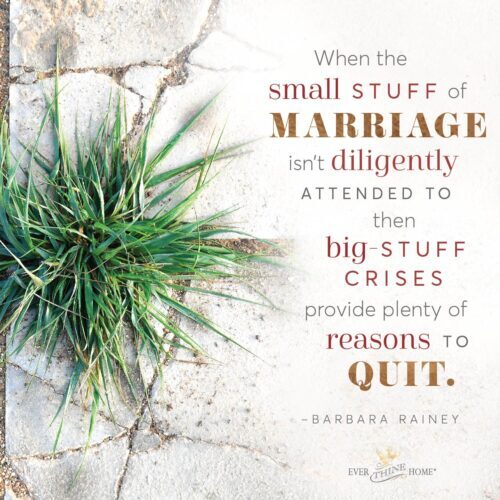
Over our fifty-plus years of marriage, we have experienced more dark paint on our canvas that I ever imagined, including near-death experiences, handicaps in our children, a prodigal, financial setbacks, the death of a newborn granddaughter, and many agonies known only to God.
The big stuff, the dark swaths of deeply pigmented paint, can kill many marriages.
But the truth is that hardships and suffering often reveal transparency already dulled—oneness already compromised, the light of Christ already hidden behind layers of silt.
When the small stuff of marriage isn’t diligently attended to, then big-stuff crises provide plenty of reasons to quit an already muddy marriage. Marriage, like watercolor painting, is much harder than we thought. Singer-songwriter Andrew Peterson penned these words about his marriage: “It was harder than we dreamed of; that’s what the promises are for.”
The promise of “I do” that we made at our wedding ceremonies matters. But here is the best promise of all: Nothing is too hard for God (Jeremiah 32:17). God knew we’d need this promise from Him, because our promises fail.
No marriage, no spouse, no circumstance is too hard for His redemptive resurrection power.

Our marriage has been harder than we dreamed but so worth it in the end. Because we haven’t stopped believing in each other or in our Savior, we’ve beheld the beauty of God’s transformational power. I want to shout this truth from the rooftops, to proclaim it as loudly and widely as I can: The art of marriage is worth the effort, worth the work! Like Jesus, who for the joy set before Him endured the cross (Hebrews 12:1-2), we too can find great joy and fulfillment, even happiness, in marriage if we believe in God like Jesus did.
And so often when a spouse decides to quit, it’s a refusal to believe. He or she is saying to God, “You aren’t powerful enough to fix my spouse and my hard circumstances.”
Quitting on our wedding promises is ripping up God’s glory, throwing the mud of unbelief on His painting in you before it’s complete. It’s refusing His arm of love reaching for you!
Oh, where would we be if Jesus had given up?
Where would we be if He had quit?
The good news is He didn’t!
I’ve seen miraculous proof in thousands of marriages stained with the most egregious sins, yet resurrected by a God for whom nothing is impossible.
May you courageously, tenaciously believe in Jesus’ Resurrection power for your life and marriage, in the small stuff, in the big stuff, and till death do you part.
This post was originally shared on Ann Voskamp’s blog.
The post Small Stuff, Big Stuff, and the Power of Beautiful Belief in Marriage appeared first on Ever Thine Home.
October 7, 2024
5 Ways to Grow Creativity in Your Children


You know the name George Washington Carver, right? You know he invented a crazy number of products from the lowly peanut. But do you know that he talked to God constantly as he worked in his laboratory?
His conversations went something like this: “Lord God, you made the peanut. You know every molecule. You know all that can be done with this little nut. Give me Your ideas and help me make many uses from it.”
Learning George’s story has inspired me to imitate him in my creative endeavors. I pray now more than ever about every word I write, every idea I imagine, and every creative task, knowing any ability I have comes from the God of creation. It’s great fun to cooperate with God in creating.
Since creativity is important to me, I also looked for ways to nurture creativity in my children as they were growing up. Being creative is a very messy endeavor. I worked to encourage creativity in my kids and the resulting mess was an ongoing challenge!
In spite of my angst over the constant disaster in my house, my kids “wrote” books, made homemade cards and gifts, and created forts in every room of the house and even in our backyard. They imagined themselves as ballerinas, thespians, and superheroes as they staged plays or recitals and they charged a quarter for admission to us parents to attend their performances.
Do you want to nurture creativity in your kids?

Imagination is the well-spring of creativity, and thankfully it is a gift given to every person as part of our “made in God’s image” genetics. My kids had it and so do yours.
Here are five suggestions for nurturing creativity:
Remember that your kids’ imagination is a God-given gift, even though it comes with messes. Your encouragement is crucial for their creativity to grow rather than become dulled. Give thanks for their gift. It will help you keep perspective. Make your home inspiring. Put posters of paintings or God’s creation on the walls, play great music, and keep plenty of supplies on hand for experiments. God put His first children in an inspiring, wonder-filled environment, so we can follow His model.Enhance your home with trips to the zoo, local museums, concerts, and hikes in the forest or mountains. Play concert music in the house if attending one is not possible. The more you can expose your children to lofty sights and sounds, the more their creativity will flourish.
Model creativity. It’s not just for your kids, so experiment with new foods, take an art or pottery class, or begin spending some time each week writing. It will be easier for you to encourage your kids if you, too, are experiencing the joy of creativity. Ask God to give you new ideas so you can be more like George Washington Carver! Be okay with the chaos that creativity can create. The hardest part for me was the ongoing mess in my house. Part of my wiring is a love of order, which does not coexist well with creativity. I frequently had to coach myself “this too shall pass,” and of course it did. You have your children for a season. There will be decades, if God wills, for you to live without floors encrusted with Play-Doh. Give thanks for this season of your life. Limit their exposure to television, smartphones, and iPads. These can kill creativity. Kids need to climb trees, make forts and cars and dishes out of clay or mud, and collect bugs and flowers in jars. George Washington Carver had a limited supply of equipment, but he had the Creator at his side and that was all he needed.

A favorite verse of mine is Exodus 35:35: “He has filled them with skill to do every sort of work done … by any sort of workman or skilled designer.”
May you have an imaginative, creative experience exploring new ideas and experiences to enrich your children and your own life as their mom.
It’s worth the extra messes! I promise.
The post 5 Ways to Grow Creativity in Your Children appeared first on Ever Thine Home.
September 23, 2024
Learning to Trust God in the Midst of Darkness


At age 28 I experienced my first significant encounter with a side of God that was as unknown to me as the dark side of the moon. Up until that day my life had proceeded “normally” in the light … until one fateful June morning.
One bright summer morning in early June, enthusiasm for a new quest had me up early and the kids fed and settled with toys in the other room. I was pumped to begin my new workout routine to regain my pre-baby-number-two figure.
On the carpeted floor of our bedroom I began the first set of exercises when suddenly my heart began to race wildly. I tried to stand up but instantly knew that was not happening when I almost blacked out. Something was very wrong.
Somehow I managed to crawl to our bed and call Dennis from the other room, grateful he hadn’t yet left for work. Lying there I became more afraid with each minute as my body refused to calm from catastrophic overdrive. An unknown congenital heart defect was loudly declaring its presence: My heart was beating dangerously at over 300 beats a minute.
Thirty minutes later I was in an ambulance. Alone, surrounded by machines, a siren blaring outside. I was terrified. While the driver whizzed in and out of traffic, Dennis was frantically calling friends to keep our two kids, ages 2 ½ and 18 months. Then he called our parents and others to pray for God to have mercy. Finally, he left and drove to the hospital.
Denied access to intensive care, he sat in the waiting area with his fears. Alone in the ICU room I lay with my own; eyes wide, fixed on the ceiling, my world suddenly narrowed to the space between two white curtains outside of which lay a dark unknown. We both wondered if I would survive the day.
Eight hours later God touched my heart and returned it to a regular rhythm. A dear widow’s all-day prayers were answered. There was no other explanation.
 Barbara will begin sharing a 5-part podcast series drawing from the book she is currently writing next week. Become a Friends & Family member to access all five!
Barbara will begin sharing a 5-part podcast series drawing from the book she is currently writing next week. Become a Friends & Family member to access all five!
I remember the immediate relief and gratitude, but after that moment I have no memory of anything—not seeing Dennis come back, not getting out of the hospital or seeing my two kids again. Only one memory remains: I was not me anymore.
Shaken to my core and on high alert with every heartbeat, my life became robotic, responsive only to duties. The sun no longer shone. I had lost my bearings under the shadow of a heavy dark cloud. All that I trusted was shattered by the aftershocks of this near-death experience, including my ability to trust God as I once did.
I spent the next three months in and out of cardiology offices, taking different medications then switching to other medications as they tried to figure out what in the world was wrong. My life revolved around doctor’s offices, living with side effects of dangerous drugs. And then in spite of birth control we found out I was pregnant with number three. A whole new set of fears for my unborn child took up residence alongside the fears that stalked my own life.
Finally, a name was given to my heart condition, Wolfe-Parkinson-White type 2, the worst of this usually mild condition. And it was incurable.
Niggling in the back of my mind constantly for the next nine months until our son was born healthy and normal and into the years beyond were questions like: Why did God allow this? What was He doing? What did He want me to learn? And why couldn’t I sense His nearness as I’d heard other people talk about in testimonies of the miraculous?
I was both young in age and young in faith and had not yet read the fine print in the Bible where Jesus said to His disciples, “In this world, you will have trouble [or tribulation or hardship]” (John 16:33).
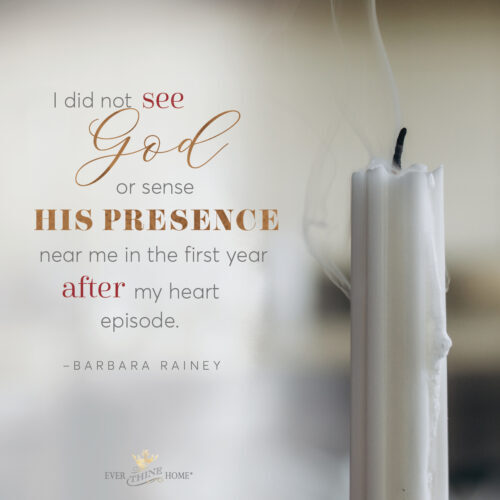
I did not see God or sense His presence near me in that first year. In fact, if anything I felt terribly alone for a long time. I had lost my youthful optimism, my joie de vivre, my expectation of remaining healthy until I got old.
A favorite author on the subject of loss, Dr. Gerald Sittser, says, “Loss is universal, but it is also a solitary experience.” I felt very alone. My experience was uncommon; not a single friend or family member could relate. And because they didn’t know what to say most said nothing, which furthered my isolation.
My unspoken soul questions were these: Who am I now? Who is this God? What is He really like? These queries were unvoiced and unwritten and only synthesized this succinctly years later. In the confining capsule of this life-altering experience I was in survival mode.
Even my husband, who experienced his own crisis of faith as he sat in a waiting room alone, wondering if he was about to be a single father of two couldn’t really understand the nagging fear I lived with every day that at any moment my heart could start racing again. In hindsight I was suffering from PTS and probably other shock waves from that traumatic experience.
And yet, in my solitude, in the dark quiet awake moments in the middle of the night, I was doing business with God. Somehow I knew He was with me, though I had no sense or feeling of His presence.

Though I couldn’t have articulated it at the time I believe now that God, as He so often does, was working in the hidden places within me. He wasn’t absent even though it felt that way. He was testing the soil of my heart, readying it to plant and grow endurance, and other unseen virtues. But mostly He was invisibly growing my faith as I invisibly and wordlessly surrendered to a God I did not understand but somehow trusted.
God was also waiting for me. He was watching to see how I’d respond. Would I continue to believe even without any answers? Would I continue to trust a God who just turned my world upside down?
Today I’m grateful for this difficult experience because I have seen God’s mysterious ways and though I don’t fully know all He planned and purposed, I do know I saw God as unpredictable, unconfined, working above and beyond what I could possibly understand.
Like Job I saw a side of God I didn’t know was there. And like the Pevensie children in C.S. Lewis’ Narnia books, I saw then and have seen many times since that Aslan is not safe, but he is good.
This is an early excerpt from a book I’ve been writing about disappointment with God. This topic has been a theme in my life, and I’m enjoying the opportunity to share what God has been teaching me. If these words encourage you, be sure to let me know!
The post Learning to Trust God in the Midst of Darkness appeared first on Ever Thine Home.
Barbara Rainey's Blog
- Barbara Rainey's profile
- 24 followers



